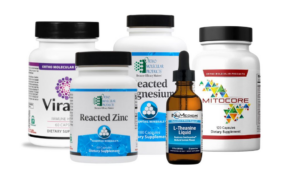Women and Menopause
Though we still have a long way to go, in recent years, more and more awareness has been shed on Women’s Health.
A major milestone is reached when a woman hits menopause (end of menstrual cycles). This stage of a woman’s life is significant, and many undesirable symptoms may arise as hormone levels change.

Studies have been researching aging as a risk factor and how it can affect health, especially during the menopausal stage, when hormonal changes arise.
“By 2030, the world population of menopausal and postmenopausal women is projected to increase to 1.2 billion, with 47 million new entrants each year.”
The transition into menopause typically starts between the ages of 45 and 55 and can last from about seven to as many as 14 years. The length of this phase can vary based on several lifestyle factors, including smoking, the age at onset, and racial and ethnic backgrounds. During this period, known as perimenopause, there is significant fluctuation in the body’s production of estrogen and progesterone, the two primary hormones produced by the ovaries.
Hormone imbalances related to menopause manifests through a myriad of symptoms.
- Irregular periods
- Vaginal dryness
- Hot flashes
- Chills
- Night sweats
- Sleep problems
- Mood changes
- Weight gain and slowed metabolism
- Thinning hair and dry skin
- Loss of breast fullness
Source: Mayo Clinic
These conditions often represent just the tip of the iceberg, with underlying hormone discrepancies at their core.
Private Consultations
Do you need guidance through menopause?
In the heart of Georgia, Morgan Compounding Pharmacy stands as women’s trusted pharmacy, especially in Bioidentical Hormone Replacement Therapy (BHRT).
Our commitment to personal and professional care makes us more than just a pharmacy; we are your partners in wellness, particularly for women navigating the complexities of hormone imbalances. To us, patients are family.
Working with patients, along with their health provider, our custom compounded BHRT formulations are meticulously crafted to match each patient’s unique hormonal needs, providing relief and stability where commercial, mass produced medications on the market fall short.

Our expert pharmacists are ready to discuss and assess your specific symptoms and provide recommendations for prescription hormone therapy as well as appropriate nutritional supplements that fit your situation.
Want to know your hormone levels? Learn about at-home hormone testing >>
What is Bioidentical Hormone Replacement Therapy (BHRT)?

Unlike retail pharmacies, Morgan Compounding Pharmacy offers personalized medication. Our pharmacists work together with practitioners to address women’s needs on a case-by-case manner, where every medication is made specific for each patient.
So, what is BHRT?
“Bioidentical hormone replacement therapy uses bioidentical hormones, derivatives of plant extracts chemically modified to be structurally indistinguishable from human endogenous hormones.”
Source: Journal of Women’s Health
The main differences between commercially made synthetic hormone replacement therapy (HRT) and bioidentical hormone replacement therapy (BHRT) lie in the origin, structure, and customization of the hormones used.
Origin and Structure:
- Synthetic HRT: These hormones are made from synthetic sources and may not exactly match the molecular structure of the hormones naturally produced in the human body. For example, many synthetic estrogens are derived from the urine of pregnant mares or are synthesized in ways that slightly alter their natural structure.
- BHRT: Bioidentical hormones are derived from plant estrogens that are chemically identical to those the human body produces. Compounds such as yam or soy are processed to produce hormones like estrogen, progesterone, and testosterone that are molecularly identical to human hormones.
Customization and Delivery:
- Synthetic HRT: Typically comes in standard doses and limited delivery forms, such as pills or patches, which may not meet the individual needs of all patients.
- BHRT: Can be customized in most optimal dosage form to match the specific hormonal needs of each individual. This allows healthcare providers to tailor medications that address specific symptoms for best absorption and results.
What are Georgia doctors prescribing?
For women, common BHRT compounds include estrogen, progesterone, testosterone, DHEA and which may be pivotal in addressing menopause, perimenopause, and postmenopause symptoms.
Estrogen (Estrone, Estriol, & Estradiol)
Estrogen is commonly prescribed in various forms to address hormonal imbalances in women. A popular formulation is Bi-est, which combines Estriol and Estradiol. In some cases, a mix of all three estrogens, known as Tri-est, is used. Low levels of estrogen can lead to symptoms such as hot flashes, night sweats, irregular periods, mood swings, and vaginal dryness. Estrogen is also important for preventing osteoporosis and maintaining the health of the bladder and urinary tract. Imbalances might cause nausea, stomach upset, bloating, headache, dizziness, breakthrough bleeding, breast tenderness, fluid retention, weight gain, and mood changes.
Progesterone
Progesterone is used to manage conditions ranging from menopause symptoms and PMS to irregular menstrual cycles and endometriosis. It acts as a mild diuretic, a natural antidepressant, and helps the body utilize fat for energy. It also normalizes blood clotting, regulates thyroid hormone action and blood sugar levels, and can mitigate some of the side effects of estrogen. Additionally, progesterone supports bone health and may enhance libido. Imbalances in progesterone levels can cause symptoms like excessive sleepiness, dizziness, bloating, susceptibility to yeast infections, and functional estrogen deficiency.
Testosterone
Although typically associated with men, testosterone is also naturally produced in women, albeit in lower quantities. It is beneficial for enhancing libido, energy levels, and muscle strength. Elevated testosterone levels in women can lead to oily skin, acne, increased body hair, and a deeper voice.
DHEA (Dehydroepiandrosterone)
DHEA serves as a precursor to several hormones, including estrogens and testosterone. It plays a crucial role in boosting the immune system, enhancing energy, and improving muscle strength. High levels of DHEA, however, may cause symptoms such as acne, oily skin, agitation, and potential hair loss.
Each of these hormones is critical to maintaining various aspects of health and well-being, and imbalances can lead to a range of symptoms. At Morgan Compounding Pharmacy, we offer personalized Bioidentical Hormone Replacement Therapy tailored to your specific needs, complemented by our Replete Program to ensure optimal hormone balance and overall health.
Bioidentical Hormone Replacement Therapy (BHRT) can be administered in various dosage forms to accommodate different patient needs and preferences. Here are some common forms:
- Capsules & Tablets: Oral capsules or tablets that are swallowed.
- Creams: Topical applications absorbed through the skin or vagina.
- Gels: Clear, topical applications similar to creams.
- Troches: Small lozenges that dissolve between the cheek and gum to deliver hormones directly into the bloodstream.
- Suppositories: Rectal or vaginal inserts that dissolve to release hormones.
Support Beyond Prescription Medication: The Replete Supplement Program
We recognized that true health extends beyond hormone balance and introduced the Replete Supplement Program. This initiative complements your BHRT regimen with expert-recommended supplements to help your body receive the holistic support it may need. Whether it’s bolstering bone density, enhancing cardiovascular health, or promoting overall vitality, our pharmacists are here to guide you through selecting the right supplements to accompany your medication.
Replete
Supplement Program
by Morgan Compounding Pharmacy
One of the side effects of prescription medications is the depletion of vital nutrients and vitamins in your body.

Visit Us in Alpharetta, Georgia
Whether you’re a patient seeking relief from hormone-related discomfort or a healthcare provider looking for reliable compounding services for your patients, Morgan Compounding Pharmacy is ready to serve you. Located in the heart of Georgia, we invite you to visit our pharmacy and discover the range of in-stock supplements that support your journey toward balanced health.
In embracing the unique needs of each individual, we pave the way for more compassionate healthcare.
Contact Us Today

For personalized compounding solutions, visit us at visit us at 305 South Main Street, Alpharetta, Georgia 30009, or fax your Rx Order Forms to 770-809-5048.
Citations:
Chubak, J., Tworoger, S. S., Yasui, Y., Ulrich, C. M., Stanczyk, F. Z., & McTiernan, A. (2004). Associations between reproductive and menstrual factors and postmenopausal sex hormone concentrations. Cancer Epidemiology Biomarkers & Prevention, 13(8), 1296-1301.
Dilks, A., & Soos, E. (2019). Bioidentical hormone replacement therapy: implications for practice. Journal of Aesthetic Nursing, 8(4), 166-171.
Edwards, B. J., & Li, J. (2013). Endocrinology of menopause. Periodontology 2000, 61(1), 177-194.
Gracia, C. R., Freeman, E. W., Sammel, M. D., Lin, H., & Mogul, M. (2007). Hormones and sexuality during transition to menopause. Obstetrics & Gynecology, 109(4), 831-840.
Grady, D., Rubin, S. M., Petitti, D. B., Fox, C. S., Black, D., Ettinger, B., … & Cummings, S. R. (1992). Hormone therapy to prevent disease and prolong life in postmenopausal women. Annals of internal medicine, 117(12), 1016-1037.
Hale, G. E., Robertson, D. M., & Burger, H. G. (2014). The perimenopausal woman: endocrinology and management. The Journal of steroid biochemistry and molecular biology, 142, 121-131.
Hill, K. (1996). The demography of menopause. Maturitas, 23(2), 113-127.
Vitale, G., Salvioli, S., & Franceschi, C. (2013). Oxidative stress and the ageing endocrine system. Nature Reviews Endocrinology, 9(4), 228-240.

